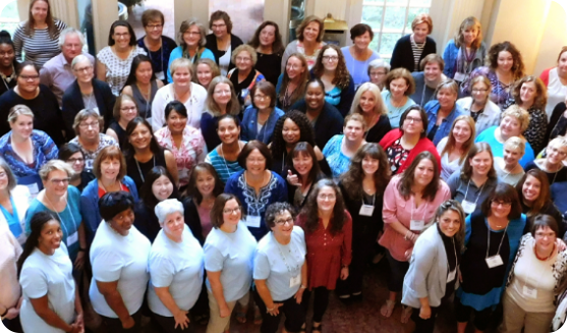
Develop leadership skills to:
- Actively engage in broader early childhood initiatives
- Use TA effectively
- Build a more effective and sustainable state system that can support a competent early childhood workforce
Leadership Knowledge and Skills
Leadership Competencies for Part C and Part B/619 Staff Poster Presented at the 2023 OSEP Leadership and Project Directors Conference
- A set of leadership knowledge and skills that Part C and Part B/619 Coordinators and staff should have at the Foundational, Operational, and Strategic Leadership levels. These competencies were developed using a participatory process with the Part C and Part B/619 Coordinators.
Link to Leadership Academy Portal- Login Required
Resources
- ECPC Adult Learning Planning Tool
- ECPC Adult Learning Planning Tool with Examples The ECPC Adult Learning Planning Tool is for use by higher education faculty and professional development providers when planning and implementing a topic/content/practice. These seven evidence-based adult learning practices are derived from a meta-synthesis of 15 research reviews of professional development which included 550 studies and 50,000 teachers and practitioners (Dunst, Bruder, & Hamby, 2015).
- Involving Families in State Personnel Development: A Step-by-Step Guide - Involving Families in State Personnel Development: A Step-by-Step Guide
- Link to State CSPD Page - Tools and resources to develop a state CSPD (Comprehensive System of Personnel Development)
- Developing an Action Plan - Leadership - Process and Evaluation Tools for Developing Action Plan
- Cross-Disciplinary Competencies - Representatives from each of the seven professional organizations reviewed the competency areas and sub-areas and presented these core competency areas for approval to each of their respective organizations. American Occupational Therapy Association (AOTA); the American Physical Therapy Association (APTA); the American Speech-Language-Hearing Association (ASHA); the Council of Exceptional Children (CEC) and the Division of Early Childhood (DEC), the National Association for the Education of Young Children (NAEYC); and ZERO TO THREE
- Cross-Disciplinary Competencies - Case studies and articles illustrate the cross-disciplinary competencies and are for use by Higher Education faculty and Professional development staff.
- ECPC Self Assessment of Family Engagement for Administrators - Self-assessment to measure our family/stakeholder engagement.
- DEC/ITCA Joint Position Statement - Service Coordination and Early Intervention
- DEC/ITCA Executive Summary - Service Coordination and Early Intervention
The Division for Early Childhood (DEC) of the Council for Exceptional Children (CEC) and the IDEA Infant & Toddler Coordinators Association (ITCA) collaborated on this joint position statement to acknowledge the importance of early intervention (EI) service coordination and recognize the expertise and needs of the professionals who provide this service.
- Strategic Planning Worksheet - Use this template to walk you through a problem and proposed solution, going step by step.
-
- Problem Identification
- Proposed Solution
- Building Your Network
- Communication Plan
- Political Environment
- Data
ECPC Website Overview Zoom Recording
Topical presentation to IDEA ITCA membership call 6/1/2023.
EI/ECSE Standards PD Guides
These guides provide sample outlines for professional development content related to the standard and its components.
Standard 1: Child Development and Early Learning
1.1 Demonstrate an understanding of the impact that different theories and philosophies of early learning and development have on assessment, curriculum, intervention, and instruction decisions.
1.2 Apply knowledge of normative sequences of early development, individual differences, and families’ social, cultural, and linguistic diversity to support each child’s development and learning across contexts.
1.3 Apply knowledge of biological and environmental factors that may support or constrain children's early development and learning as they plan and implement early intervention and instruction.
1.4 Demonstrate an understanding of characteristics, etiologies, and individual differences within and across the range of abilities, including developmental delays and disabilities, their potential impact on children’s early development and learning, and implications for assessment, curriculum, instruction, and intervention.
Standard 2: Partnering with Families
2.1 Apply their knowledge of family-centered practices, family systems theory, and the changing needs and priorities in families’ lives to develop trusting, respectful, affirming, and culturally responsive partnerships with all families that allow for the mutual exchange of knowledge and information.
2.2 Communicate clear, comprehensive, and objective information about resources and supports that help families make informed decisions and advocate for access, participation, and equity in natural and inclusive environments.
2.3 Engage families in identifying their strengths, priorities, and concerns; support families to achieve the goals they have for their family and their young child’s development and learning; and promote families’ competence and confidence during the assessment, individualized planning, intervention, instruction, and transition processes.
Standard 3: Collaboration and Teaming
3.1 Apply teaming models, skills, and processes, including appropriate uses of technology, when collaborating and communicating with families; professionals representing multiple disciplines, skills, expertise, and roles; and community partners and agencies.
3.2 Use a variety of collaborative strategies when working with other adults that are evidence-based, appropriate to the task, culturally and linguistically responsive, and take into consideration the environment and service delivery approach.
3.3 Partner with families and other professionals to develop individualized plans and support the various transitions that occur for the young child and their family throughout the birth through 8 age span.
Standard 4: Assessment Processes
4.1 Understand the purposes of formal and informal assessment, including ethical and legal considerations, and use this information to choose developmentally, culturally, and linguistically appropriate, valid, reliable tools and methods that are responsive to the characteristics of the young child, family, and program.
4.2 Develop and administer informal assessments and/or select and use valid, reliable formal assessments using evidence-based practices, including technology, in partnership with families and other professionals.
4.3 Analyze, interpret, document, and share assessment information using a strengths-based approach with families and other professionals.
4.4 In collaboration with families and other team members, use assessment data to determine eligibility, develop child and family-based outcomes/goals, plan for interventions and instruction, and monitor progress to determine the efficacy of programming.
Standard 5: Application of Curriculum Frameworks in the Planning and Facilitation of Meaningful Learning Experiences
5.1 Collaborate with families and other professionals in identifying an evidence-based curriculum addressing developmental and content domains to design and facilitate meaningful and culturally responsive learning experiences that support the unique abilities and needs of all children and families.
- 5.1 Application of Curriculum Framework in the Planning of Meaningful Learning Experiences
- PD-Facilitator Guide 5.1
5.2 Use their knowledge of early childhood curriculum frameworks, developmental and academic content knowledge, and related pedagogy to plan and ensure equitable access to universally designed, developmentally appropriate, and challenging learning experiences in natural and inclusive environments.
Standard 6: Application of Curriculum Frameworks in the Planning and Facilitation of Meaningful Learning Experiences
6.1 In partnership with families, identify systematic, responsive, and intentional evidence-based practices and use such practices with fidelity to support young children’s learning and development across all developmental and academic content domains.
- 6.1 Using Responsive and Reciprocal Interactions, Interventions, and Instruction
- PD-Facilitator Guide 6.1
6.2 Engage in reciprocal partnerships with families and other professionals to facilitate responsive adult-child interactions, interventions, and instruction in support of child learning and development.
- 6.2 Using Responsive and Reciprocal Interactions, Interventions, and Instruction
- PD-Facilitator Guide 6.2
6.3 Engage in ongoing planning and use flexible and embedded instructional and environmental arrangements and appropriate materials to support the use of interactions, interventions, and instruction addressing developmental and academic content domains and are adapted to meet the needs of each and every child and their family.
- 6.3 Using Responsive and Reciprocal Interactions, Interventions, and Instruction
- PD-Facilitator Guide 6.3
6.4 Promote young children’s social and emotional competence and communication, and proactively plan and implement function-based interventions to prevent and address challenging behaviors.
- 6.4 Using Responsive and Reciprocal Interactions, Interventions, and Instruction
- PD-Facilitator Guide 6.4
6.5 Identify and create multiple opportunities for young children to develop and learn play skills and engage in meaningful play experiences independently and with others across contexts.
- 6.5 Using Responsive and Reciprocal Interactions, Interventions, and Instruction
- PD-Facilitator Guide 6.5
6.6 Use responsive interactions, interventions, and instruction with sufficient intensity and types of support across activities, routines, and environments to promote child learning and development and facilitate access, participation, and engagement in natural environments and inclusive settings.
- 6.6 Using Responsive and Reciprocal Interactions, Interventions, and Instruction
- PD-Facilitator Guide 6.6
6.7 Plan for, adapt, and improve approaches to interaction, intervention, and instruction based on multiple sources of data across a range of natural environments and inclusive settings.
- 6.7 Using Responsive and Reciprocal Interactions, Interventions, and Instruction
- PD-Facilitator Guide 6.7
Standard 7: Professionalism and Ethical Practice
7.1 Engage with the profession of EI/ECSE by participating in local, regional, national, and/or international activities and professional organizations.
7.2 Engage in ongoing reflective practice and access evidence-based information to improve their own practices.
7.3 Exhibit leadership skills in advocating for improved outcomes for young children, families, and the profession, including the promotion of and use of evidence-based practices and decision-making.
7.4 Practice within ethical and legal policies and procedures.
![]()
What are the DEC Recommended Practices?
Find out in this Quick Overview .pdf
The DEC RPs are also available in Spanish!
Practice Improvement Tools:Using the DEC Recommended Practices
